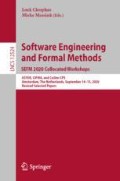Abstract
Recent developments in the formalization of reasoning, especially in computational settings, have aimed at defining cognitive and resource bounds to express limited inferential abilities. This feature is emphasized by Depth Bounded Boolean Logics, an informational logic that models epistemic agents with inferential abilities bounded by the amount of information they can use. However, such logics do not model the ability of agents to make use of information shared by other sources. The present paper provides a first account of a Multi-Agent Depth Bounded Boolean Logic, defining agents whose limited inferential abilities can be increased through a dynamic operation of becoming informed by other data sources.
This research was funded by the Department of Philosophy “Piero Martinetti” of the University of Milan under the project “Departments of Excellence 2018–2022” awarded by the Ministry of Education, University and Research (MIUR); and supported by the Austrian Science Fund (FWF) project ByzDEL (P33600). The authors wish to thank Marcello D’Agostino and Pere Pardo for comments on previous versions of this work.
Access this chapter
Tax calculation will be finalised at checkout
Purchases are for personal use only
Notes
- 1.
We use here a two-value valuation function v on formulas as a mapping to truth and falsity. Its formal definition, extended to a three-valued function, is postponed to Sect. 3.
- 2.
This example is based on an unpublished one formulated by Marcello D’Agostino.
- 3.
The two operators reflect the distinction between an alethically neutral and a veridical conception of information, see [17] and [11] respectively. Technically, it is possible to reformulate the present monotonic version of MA-DBBL without the I operator without loss of expressiveness. We keep it both in the language to preserve the mentioned conceptual distinction, and because it offers the basis for a planned extension of the present system with contradictory information updates.
- 4.
We stress here that while in single agent DBBL the depth of the reasoning process is given by nested applications of RB by the agent, in MA-DBBL are the instances of RB indexed by distinct agents that determine such depth.
References
Allo, P.: The logic of ‘being informed’ revisited and revised. Philos. Stud. 153(3), 417–434 (2011). https://doi.org/10.1007/s11098-010-9516-1
van Benthem, J.: Dynamic logic for belief revision. J. Appl. Non-Classical Logics 17(2), 129–155 (2007). https://doi.org/10.3166/jancl.17.129-155
Ceolin, D., Primiero, G.: A granular approach to source trustworthiness for negative trust assessment. In: Meng, W., Cofta, P., Jensen, C.D., Grandison, T. (eds.) IFIPTM 2019. IAICT, vol. 563, pp. 108–121. Springer, Cham (2019). https://doi.org/10.1007/978-3-030-33716-2_9
D’Agostino, M.: Depth-bounded logic for realistic agents. Logic Philos. Sci. 11, 3–57 (2013)
D’Agostino, M.: Informational semantics, non-deterministic matrices and feasible deduction. In: Fernández, M., Finger, M. (eds.) Proceedings of the 8th Workshop on Logical and Semantic Frameworks, LSFA 2013, São Paulo, Brazil, 2–3 September 2013, Electronic Notes in Theoretical Computer Science, vol. 305, pp. 35–52. Elsevier (2013). URL https://doi.org/10.1016/j.entcs.2014.06.004
D’Agostino, M.: Semantic information and the trivialization of logic: Floridi on the scandal of deduction. Information 4(1), 33–59 (2013). https://doi.org/10.3390/info4010033
D’Agostino, M.: Analytic inference and the informational meaning of the logical operators. Logique Anal. 227, 407–437 (2014)
D’Agostino, M.: An informational view of classical logic. Theor. Comput. Sci. 606, 79–97 (2015). https://doi.org/10.1016/j.tcs.2015.06.057
van Ditmarsch, H., Halpern, J., van der Hoek, W., Kooi, B.: Handbook of Epistemic Logic. College Publications, London (2015)
Ditmarsch, H., van der Hoek, W., Kooi, B.: Dynamic Epistemic Logic and Philosophy Of Science. Springer, Berlin (2007)
Floridi, L.: The logic of being informed. Logique et Analyse 49(196), 433–460 (2006). http://www.jstor.org/stable/44085232
Floridi, L.: Semantic information and the correctness theory of truth. Erkenntnis 74(2), 147–175 (2011). https://doi.org/10.1007/s10670-010-9249-8
Stegenga, J.: Information quality in clinical research. In: Floridi, L., Illari, P. (eds.) The Philosophy of Information Quality. SL, vol. 358, pp. 163–182. Springer, Cham (2014). https://doi.org/10.1007/978-3-319-07121-3_9
Larese, C.: The principle of analyticity of logic, a philosophical and formal perspective. Ph.D. thesis, Scuola Normale Superiore, Classe di Scienze Umane (2019)
Meyer, J.J.C., Hoek, W.v.d.: Epistemic Logic for AI and Computer Science. Cambridge Tracts in Theoretical Computer Science. Cambridge University Press (1995). https://doi.org/10.1017/CBO9780511569852
Primiero, G.: An epistemic constructive definition of information. Logique et Analyse 50(200), 391–416 (2007)
Primiero, G.: An epistemic logic for becoming informed. Synthese 167(2), 363–389 (2009). https://doi.org/10.1007/s11229-008-9413-8
Primiero, G.: A logic of negative trust. J. Appl. Non Class. Logics 30(3), 193–222 (2020). https://doi.org/10.1080/11663081.2020.1789404
Primiero, G., Raimondi, F., Bottone, M., Tagliabue, J.: Trust and distrust in contradictory information transmission. Appl. Netw. Sci. 2(1), 1–30 (2017). https://doi.org/10.1007/s41109-017-0029-0
Author information
Authors and Affiliations
Corresponding author
Editor information
Editors and Affiliations
Rights and permissions
Copyright information
© 2021 Springer Nature Switzerland AG
About this paper
Cite this paper
Cignarale, G., Primiero, G. (2021). A Multi-Agent Depth Bounded Boolean Logic. In: Cleophas, L., Massink, M. (eds) Software Engineering and Formal Methods. SEFM 2020 Collocated Workshops. SEFM 2020. Lecture Notes in Computer Science(), vol 12524. Springer, Cham. https://doi.org/10.1007/978-3-030-67220-1_14
Download citation
DOI: https://doi.org/10.1007/978-3-030-67220-1_14
Published:
Publisher Name: Springer, Cham
Print ISBN: 978-3-030-67219-5
Online ISBN: 978-3-030-67220-1
eBook Packages: Computer ScienceComputer Science (R0)

